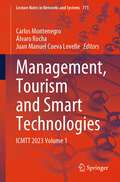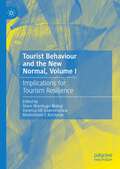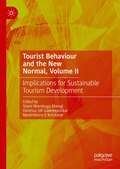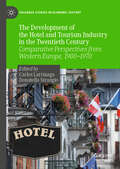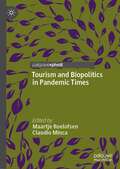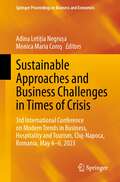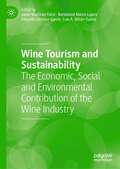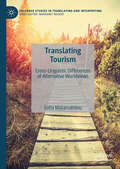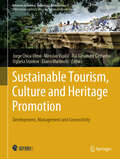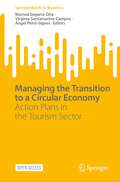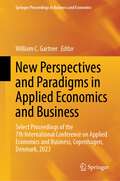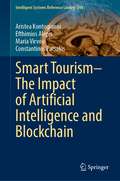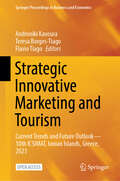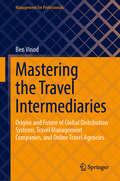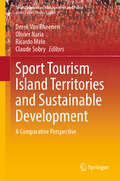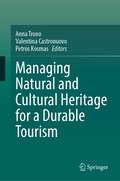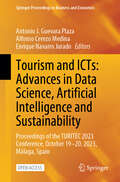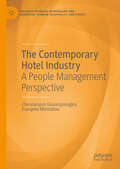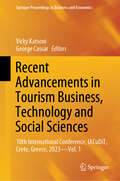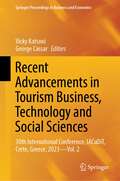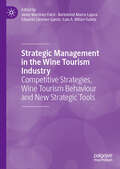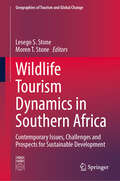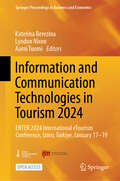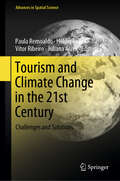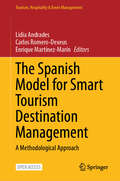- Table View
- List View
Management, Tourism and Smart Technologies: ICMTT 2023 Volume 1 (Lecture Notes in Networks and Systems #773)
by Carlos Montenegro Álvaro Rocha Juan Manuel Cueva LovelleThis book presents advances in the research of various entities in the world, which are working on the application of technology or management in tourism. Indeed, one of the sectors hardest hit by the pandemic was tourism, likewise one of the post-pandemic effects is the rapid recovery of the sector, but more importantly is the great innovation that has occurred in marketing strategies for tourism using technology and applying management strategies not only to be more profitable but to have the best customer satisfaction. The book is aimed at the general public that seeks to innovate, learn from lessons learned and establish a knowledge base in mechanisms that apply technology or management in tourism, with the aim of improving the experience of all those involved in the business chain.This compendium aims to share all those great experiences and researches in the areas of: Managements, Tourism, Marketing strategies in Management, Tourism and Technology, Technology, Applied Computer Science, Artificial Intelligence, Business Administration, Cloud Computing, Educational Management, Finance, Insurance and Services Management, Health Tourism, Human Resource Management, Information Systems Planning and Management, Information Technologies in Tourism, Internet Technology, Knowledge Management, Management of Supply Chain and Logistics, Marketing Innovation, Robotics, Strategic Management Innovation, Sustainability Management, Technical Economy Management, Technical Innovation and Management, Technology in Tourism and Tourist Experience, Tourism Industry and Ecology, Tourism Management, a total of 77 research projects and many spaces and relationships between researchers to collaborate in the advancement of science are presented.
Tourist Behaviour and the New Normal, Volume I: Implications for Tourism Resilience
by Shem Wambugu Maingi Vanessa Gb Gowreesunkar Maximiliano E KorstanjeThis book delves into tourist behavior and sustainable tourism, especially in the post-pandemic era. Amid the pandemic, Ukraine-Russia tensions, social shifts, geopolitical changes, and climate concerns, the tourism industry has witnessed significant shifts in travel patterns. The sector now grapples with newfound complexities driven by emerging tourism experiences, niche markets, and technology-driven services. Interestingly, these complexities have paved the way for more sustainable consumption patterns.Contributors in Volume I explore the tourism industry's enhanced resilience. The book suggests solutions across nine thematic areas aligned with the UN Sustainable Development Goals. In summary, it explores the evolving landscape of tourist behavior and its implications for tourism resilience in a rapidly changing world.
Tourist Behaviour and the New Normal, Volume II: Implications for Sustainable Tourism Development
by Shem Wambugu Maingi Vanessa Gb Gowreesunkar Maximiliano E KorstanjeThis book delves into tourist behavior and sustainable tourism, especially in the post-pandemic era. Amid the pandemic, Ukraine-Russia tensions, social shifts, geopolitical changes, and climate concerns, the tourism industry has witnessed significant shifts in travel patterns. The sector now grapples with newfound complexities driven by emerging tourism experiences, niche markets, and technology-driven services. Interestingly, these complexities have paved the way for more sustainable consumption patterns.Contributors in Volume II, explore sustainable development with topics such as environmental and economic sustainability, as well as governance and ethics covered. Taken together, these collections propose solutions in nine thematic areas that are relevant to the UN Sustainable Development G
The Development of the Hotel and Tourism Industry in the Twentieth Century: Comparative Perspectives from Western Europe, 1900–1970 (Palgrave Studies in Economic History)
by Carlos Larrinaga Donatella StrangioThis edited collection explores the pivotal role of the hotel industry in building Western Europe’s tourism economy during the 20th century. The book brings together ten contributions focused on the same period, 1900-1970, to offer comparative perspectives from across the region including Italy, Switzerland, France, Spain and Britain. Drawing on historical case studies, chapters illuminate the different factors linking hotels and the broader tourism system including interventions of the public authorities and the State, the importance of private involvement, commercial strategies, the medium-term development of private hotels, hotel entrepreneurship, and the impact of economic crises and wars. By placing differing national approaches taken to the growth of the hotel industry in comparison, the book aims to fill a gap in the historiography of European hospitality and shed light on the wider impact of hotels and tourism on economic development at both a national and regional level. It will be of interest to a range of scholars, including in economic and business history, tourism studies, the history of tourism management, and social history.
Tourism and Biopolitics in Pandemic Times
by Maartje Roelofsen Claudio MincaThis edited collection brings together interventions on the geographies of tourism in pandemic times approached from a biopolitical perspective. Whilst the “management of bodies” has always been a constitutive part of tourism and its spatialities, the COVID-19 pandemic has prompted the emergence of entirely new “states of exception” and emergency regimes, geared towards tight restrictions and control over the mobility and embodied practices of millions of travelers and tourists. Debates in tourism over the “politics of life”, now more than ever, ought to concern health and wellbeing for both individuals and selected populations, not in the least because tourism has provided in many instances the socio-spatial conditions for the virus to spread. This book intends to show how a biopolitical analytical framework may provide a set of insights and critical perspectives that are key to the understanding of contemporary tourism practices and regimes of mobility, security, and in/exclusion – particularly in relation to the COVID-19 pandemic.
Sustainable Approaches and Business Challenges in Times of Crisis: 3rd International Conference on Modern Trends in Business, Hospitality and Tourism, Cluj-Napoca, Romania, May 4-6, 2023 (Springer Proceedings in Business and Economics)
by Adina Letiția Negrușa Monica Maria CoroşThis book discusses current trends, challenges, and opportunities in the fields of business, hospitality, and tourism, particularly in Eastern Europe. Featuring selected papers presented at the second annual Modern Trends in Business Hospitality and Tourism International Conference held in Cluj-Napoca, Romania in 2023, the enclosed chapters explore the global marketing environment discussing the latest technological, economic and social-cultural developments. Featuring theoretical and empirical research and real-life case studies, this book explores topics such as global capital markets and investment financing post COVID-19, sustainable business models, financing alternatives for SMEs, corporate governance, human capital leadership, among others. It is appropriate for academics, researchers, scholars and practitioners in the areas of business, hospitality and tourism.
Wine Tourism and Sustainability: The Economic, Social and Environmental Contribution of the Wine Industry
by Javier Martínez-Falcó Bartolomé Marco-Lajara Eduardo Sánchez-García Luis A. Millán-TudelaClimate change has put the survival andviability of wine-growing regions at risk. Whereas the implementation of sustainableapproaches was once seen as a source of competitive advantage, it is now criticalto the survival of the industry. Winetourism should therefore aim to minimize possible cultural and environmentaldamage while improving the economic and social well-being of the wine-growingregion. Contributing to the targets of SDG 8, specifically target 8.9: ‘By 2030,devise and implement policies to promote sustainable tourism that creates jobsand promotes local culture and products,’ this book argues that wine tourism canbe considered as a catalyst for the environmental sustainability of wineries. Chaptershighlight the economic, socioeconomic, environmental, socio-cultural impact ofwine tourism around the world, before concluding with a look to the future trendsand challenges. It features best practices from around the world that wineriesand wine tourism companies can incorporate into their core business functionsto make their operations more sustainable and also showcases how wineries have designedtheir tourism offerings to meet sustainable tourism development objectives
Translating Tourism: Cross-Linguistic Differences of Alternative Worldviews (Palgrave Studies in Translating and Interpreting)
by Sofia MalamatidouThis book provides a large-scale empirical multilingual study of crosslinguistic differences in the language of destination promotion. The book explores how tourism texts are negotiated in translation, and how the translated texts reflect and reconcile different worldviews, that of the destination population and that of the tourist. Using the 2-million-word TrAIL (Tourism Across and & In-between Languages) corpus, which includes examples from official tourism websites in English, French, Greek, and Russian as well as translations between these languages, the author explores the differences in the key linguistic means used in destination promotion and what these linguistic choices can tell us about how these societies view the world around them differently. The book’s interdisciplinary focus makes it relevant to not only practising translators, but also students and scholars interested in issues surrounding tourism, promotion, and translation, as well as destination promoters who want to better understand the role that language and translation play in tourism promotion.
Sustainable Tourism, Culture and Heritage Promotion: Development, Management and Connectivity (Advances in Science, Technology & Innovation)
by Uglješa Stankov Rui Alexandre Castanho Jorge Chica-Olmo Miroslav Vujičić Eliana MartinelliThis proceedings book explores future prospects of cultural, heritage, and religious tourism and how it can impact the socioeconomic complexity of a community and future developments. It includes chapters on contemporary digital age pilgrimage, digital interpretation as a management strategy, tourism in the era of digital communication, and the role of social media in conserving intangible cultural heritage. This book focuses on policies and mechanisms for heritage preservation. It includes cultural heritage tourism management, how the digitalization of data has impacted and further developed tourism, World Heritage classification in urban tourism destinations, cultural tourism products, and experiences. Moreover, it discusses the sustainable environment and geography in tourism. It covers topics such as ecotourism and rural sustainable development, heritage in socioeconomic sustainable development, and tourists' perceptions of tourism. Anotherpart of the book explores the social and economic impacts of tourism. It includes chapters on cycling tourism along the Elbe, residents' perceptions of the socioeconomic benefits of restaurants, architecture of historical mosques, tourism as a driver of soft power, tourists' perceptions of service quality, tourism during the Covid-19 pandemic, gastronomic narratives in tourism, and residents' perceptions of festivals. Also, it pinpoints the focus on user interaction-based development. It includes chapters on the role of community-led initiatives in heritage revitalization and addressing connectivity issues between historical and natural touristic heritage sites. These research papers provide valuable insights into the multidimensional nature of cultural sustainable tourism, covering a wide range of topics and offering diverse perspectives on its development, management, and impact.
Managing the Transition to a Circular Economy: Action Plans in the Tourism Sector (SpringerBriefs in Business)
by Marival Segarra-Oña Virginia Santamarina-Campos Ángel Peiró-SignesThis open access book presents an interdisciplinary analysis of the current status of the circular economy in the tourism sector. This book is presented from the perspective of researchers, policymakers, and industry. Specially aimed at companies in the tourism sector, the book offers valuable information in the field of circular economy, promoting the design/redesign of processes and products. The authors emphasize promoting the development and application of new knowledge and technologies to promote innovation in processes, products, services, and business models, promoting public-private collaboration. With contributions from experts representing varied interests throughout the tourism industry, the book encourages the involvement of economic and social agents to raise awareness of current environmental, economic, and technological challenges.
New Perspectives and Paradigms in Applied Economics and Business: Select Proceedings of the 7th International Conference on Applied Economics and Business, Copenhagen, Denmark, 2023 (Springer Proceedings in Business and Economics)
by William C. GartnerThis book features a collection of high-quality and peer-reviewed papers from the 2023 7th International Conference on Applied Economics and Business, which was held in Copenhagen, Denmark, during August 24-26, 2023. ICAEB is held annually as a platform for the presentation of new advances and research results in the fields of applied economics and business. Applied economics is a way of dealing with esoteric economic concepts in a practical and analytical way. It allows for decisions to be made that are underlined by theoretical economic principles but utilized in such a way that they transform into real work applications.The contributors cover topics such as environment, development, finance, forensics, information, institutions, international, labor, management, mathematics, currency, tourism and many more. Applied Economics affects all aspects of life and science and it is brought to the forefront in this collection of papers. The conference, with its aim to bring together economists from different fields, lends itself to a natural and rich collection of scientific papers all focused on the practical application of economic principles. The scope of this collection of papers will be useful to academics and practitioners who look to economics to help solve problems.
Smart Tourism–The Impact of Artificial Intelligence and Blockchain (Intelligent Systems Reference Library #249)
by Aristea Kontogianni Efthimios Alepis Maria Virvou Constantinos PatsakisThis book offers a fresh perspective on smart tourism, introducing unique frameworks and insights with the potential to shape the industry's future. It explores the convergence of technology, tourism, and smart cities, emphasizing the use of smartphones, social media data, AI, blockchain, crowdsourcing, and crowdsensing to enhance tourism experiences.What sets it apart is its focus on practical solutions that require minimal infrastructure investments, making it accessible to a wide range of stakeholders. This book addresses knowledge gaps and proposes cutting-edge frameworks for smart tourism development. It is intended for researchers, academics, and professionals in tourism, technology, and urban planning.Key uses of this book include providing a comprehensive overview of the evolving smart tourism landscape and serving as a valuable resource for researchers and educators in this dynamic field.
Strategic Innovative Marketing and Tourism: Current Trends and Future Outlook—10th ICSIMAT, Ionian Islands, Greece, 2023 (Springer Proceedings in Business and Economics)
by Androniki Kavoura Teresa Borges-Tiago Flavio TiagoThis open access book presents the latest findings of researchers from around the globe who presented their work at the 10th international conference of Strategic Innovative Marketing and Tourism (ICSIMAT) in 2023. It provides an up-to-date information and discusses current trends, issues, and debates, both theoretical and practical research, on strategic innovative marketing and tourism and applications from social media and emerging technologies in Artificial Intelligence and the Internet of Everything. Topics covered in the chapters include social media in marketing and tourism hospitality, culture, strategic tools, and techniques employed and implemented by some of the top research laboratories in the world to the industry. This book brings together work from both academia and industry and continues the successful impact of the previous years' conference on the academic discussion of the topics.
Mastering the Travel Intermediaries: Origins and Future of Global Distribution Systems, Travel Management Companies, and Online Travel Agencies (Management for Professionals)
by Ben VinodThis book chronicles the role of travel intermediaries: global distribution systems (GDS), travel management companies (TMC), and online travel agencies (OTA) in the distribution of travel products. The book covers the historical development of these intermediaries and explores their current state and future prospects. Almost six decades after the introduction of computerized reservations systems and four decades after the introduction of Global Distribution Systems that allowed travel agents to make automated airline bookings, the distribution of air products is amid a major transition. A fundamental change is pricing power, which shifts from the GDSs to the airlines for the indirect channel. These changes are driven by advancements in technology, market economics, and airline cost controls, leading to the emergence of new revenue models that will permanently alter the landscape of air distribution. As a result, travel intermediaries are experiencing the effects of these turbulenttimes and must adopt innovative approaches and initiatives to adapt and transform their business models rather than maintaining the status quo. In addition to the ongoing transformation, over the next decade, the advancements in emerging technologies like blockchain and decentralized digital identity will further revolutionize the distribution landscape across all sectors of the travel industry.
Sport Tourism, Island Territories and Sustainable Development: A Comparative Perspective (Sports Economics, Management and Policy #24)
by Ricardo Melo Claude Sobry Derek Van Rheenen Olivier NariaThis edited volume discusses the role of sport tourism in local sustainable development in small island territories. Using an international, comparative study, this volume explores the contributions of sport tourism to sustainable development in island settings. Written by 25 research teams across ten seas, oceans, and island archipelagos, chapters present comparative findings with the view of assisting stakeholders and decision-makers in collaboratively and responsibly developing island territories in accordance with specific sustainable development goals. Presenting a refined comparative methodology at the intersection of sport tourism and sustainable development, this book is geared towards academic researchers and students interested in sport tourism, sports economics, management and sustainable development, as well as professionals.
Managing Natural and Cultural Heritage for a Durable Tourism
by Anna Trono Valentina Castronuovo Petros KosmasThis contributed volume offers a wealth of cases that explore the factors and conditions required for heritage tourism to be economically and socially beneficial to local communities without impairing the natural environment, cultural heritage preservation, or sustainability for future generations. The studies presented here comprise an examination of measures which have been and can be implemented to ensure sustainable use of natural and cultural systems, leading to a new concept of tourism that incorporates science and community practices together to create a favorable environment where tourists and locals can experience meaningful interactions and experiences. The book focuses on the role of stakeholders in the development of a new policy regarding the sustainable management of cultural tourism and the possibility of their involvement in the processes governing policy-making. Emphasis is placed on the role and commitment of local and international authorities, including UNESCO, in preserving the world's endangered cultural and natural heritage, as well as the responsibilities of Member States and public and private actors with respect to future conservation challenges.
Tourism and ICTs: Proceedings of the TURITEC 2023 Conference, October 19–20, 2023, Málaga, Spain (Springer Proceedings in Business and Economics)
by Antonio J. Guevara Plaza Alfonso Cerezo Medina Enrique Navarro JuradoThis open-access book presents the best research papers from the XIV International Congress on Tourism and Information and Communications Technologies (TURITEC2023), held in Málaga, Spain from 19 to 20 October 2023. The book explores the profound impact of COVID-19 on the tourism industry and the increasing importance of digitalization and Information and Communication Technologies (ICTs) as key drivers for the industry's recovery, alongside sustainability. This curated collection of research papers offers conceptualizations, methodologies, analyses, and empirical case studies that illuminate the path to a resilient and sustainable future for tourism.
The Contemporary Hotel Industry: A People Management Perspective (Palgrave Advances in Managing and Marketing Tourism, Hospitality, and Events)
by Charalampos Giousmpasoglou Evangelia MarinakouThis book provides a detailed account of the global hotel industry with a focus on managerial work and people management. A comprehensive understanding of the managers' work from a people management perspective is essential to the success of hotel operations; however, this is an area that has been under-researched.Based on existing literature and extensive research carried out by the authors over fifteen years, the book explores the different aspects of managerial work in global hotel industry settings and covers topics such as general management, leadership, education and training, skills and competencies, crisis management, and managing diversity. The book’s findings suggest that hotel managers should adopt a people-centric management and leadership style while at the same time maintaining operational efficiency.A unique book in terms of scale and depth, it offers useful insights into both theoretical and practical perspectives.
Recent Advancements in Tourism Business, Technology and Social Sciences: 10th International Conference, IACuDiT, Crete, Greece, 2023—Vol. 1 (Springer Proceedings in Business and Economics)
by Vicky Katsoni George CassarThe book features the first volume of the proceedings of the 10th International Conference of the International Association of Cultural and Digital Tourism (IACuDiT), with the theme “Recent Advancements in Tourism Business, Technology, and Social Sciences,” which was held from August 29 to 31, 2023, in Crete, Greece. It showcases the latest research on Tourism Business, Technology, and Social Sciences and presents a critical academic discourse on smart and sustainable practices in the tourism industry, stimulating future debates and advancing readers’ knowledge and understanding of this critical area of tourism business in the post-COVID-19 era. COVID-19 produced dramatic effects on the global economy, business activities, and people, with tourism being particularly affected. The book discusses the resulting digital transformation process in a range of areas, including its effect on the social sciences combined with special forms of tourism. This accelerated digitalization encourages the emergence of new digital products and services based on the principle of flexibility. The book focuses on the knowledge economy and smart destinations, as well as new modes of tourism management and development, and includes chapters on emerging technologies such as the Internet of Things, artificial intelligence, big data, and robotics in connection with various tourism practices.
Recent Advancements in Tourism Business, Technology and Social Sciences: 10th International Conference, IACuDiT, Crete, Greece, 2023 - Vol. 2 (Springer Proceedings in Business and Economics)
by Vicky Katsoni George CassarThe book features the second volume of the proceedings of the 10th International Conference of the International Association of Cultural and Digital Tourism (IACuDiT), with the theme “Recent Advancements in Tourism Business, Technology, and Social Sciences,” which was held from August 29 to 31, 2023, in Crete, Greece. It showcases the latest research on Tourism Business, Technology, and Social Sciences and presents a critical academic discourse on smart and sustainable practices in the tourism industry, stimulating future debates and advancing readers’ knowledge and understanding of this critical area of tourism business in the post-COVID-19 era. COVID-19 produced dramatic effects on the global economy, business activities, and people, with tourism being particularly affected. The book discusses the resulting digital transformation process in a range of areas, including its effect on the social sciences combined with special forms of tourism. This accelerated digitalizationencourages the emergence of new digital products and services based on the principle of flexibility. The book focuses on the knowledge economy and smart destinations, as well as new modes of tourism management and development, and includes chapters on emerging technologies such as the Internet of Things, artificial intelligence, big data, and robotics in connection with various tourism practices.
Strategic Management in the Wine Tourism Industry: Competitive Strategies, Wine Tourism Behaviour and New Strategic Tools
by Javier Martínez-Falcó Bartolomé Marco-Lajara Eduardo Sánchez-García Luis A. Millán-TudelaWine tourism has become increasingly popular and important in recent years, with a vast scientific research highlighting the expansion of the industry and the various benefits associated with it. As the global wine market grows, new competitive strategies, business tools and patterns of wine tourists’ demands are essential elements for the effective management of wine tourism products. This book aims to deepen the management of the wine tourism industry through the study of competitive strategies developed by wineries. It also explores perceptions, preferences, and expectations of wine tourists, as well as the analysis of new tools to improve the wine tourism product. In doing so, contributors make the case for effective strategic management that can help wineries determine their target markets, identify their competitive advantages, develop pricing strategies and create effective marketing campaigns. The book is therefore useful for both wine professionals and academics who wish to delve deeper into the study of the strategic management of wine tourism.
Wildlife Tourism Dynamics in Southern Africa: Contemporary Issues, Challenges and Prospects for Sustainable Development (Geographies of Tourism and Global Change)
by Moren T. Stone Lesego S. StoneThis book discusses opportunities, costs, and governance issues within the wildlife tourism space in Southern Africa. Wildlife tourism is a very important sector in Southern Africa. As such, the book discusses sustainable economic benefits local communities derive from wildlife tourism while also supporting wildlife conservation. It addresses several contemporary issues that have affected wildlife tourism, focusing on different countries in the region. These issues include international agreements such as CITES, the decline in wildlife species and reactions from the international community, human-wildlife conflicts and conflicts between states, indigenous communities living adjacent to protected areas hosting wildlife, and how to address these. As such, the book is a useful resource for researchers, tourism stakeholders, policy makers and students, especially those studying natural resource management, tourism and development and sustainable development in Southern Africaand other parts of the developing world.
Information and Communication Technologies in Tourism 2024: ENTER 2024 International eTourism Conference, Izmir, Türkiye, January 17-19 (Springer Proceedings in Business and Economics)
by Lyndon Nixon Katerina Berezina Aarni TuomiFor more than 30 years, Information and Communication Technology (ICT) has been revolutionizing travel, tourism, and hospitality, and as we look to the next 30 years, the change of pace does not seem to be diminishing. This open-access book provides an extensive overview of the latest developments of ICTs in the tourism and hospitality industry. Featuring papers presented at the International Federation for IT and Travel & Tourism’s (IFITT) 31st annual ENTER International eTourism Conference (ENTER24) held in Izmir, Türkiye, this book presents research on topics such as artificial general intelligence (AGI) in tourism and hospitality; emerging technologies in tourism education; virtual reality; technologies for sustainability, health and wellbeing; big data and analytics, among others. This is an open access book.
Tourism and Climate Change in the 21st Century: Challenges and Solutions (Advances in Spatial Science)
by Paula Remoaldo Juliana Alves Vítor Ribeiro Hélder LopesThis book explores the effects of climate on tourism and the effectiveness of climate adaptation in this sector. Taking into account the spatial dimension of tourism and climate change, it highlights the need for more detailed information, the weak interaction between stakeholders, and the limitation of resources in the context of rapid changes, brought on by the necessary implementation of the third-order stage of tourism. The book focuses on adaptation, mitigation, and resilience to climate change, including topics such as human thermal comfort of visitors, the water resources in tourism areas, the circular economy, the mobility and transports, the psychological aspects of weather and climate in recreational practices. The book concludes an assessment of the status, challenges, and prospects for the adaptation of the tourism sector to climate change. The book appeals to scholars and students of economic geography, regional and spatial science, tourism economics, and related fields.
The Spanish Model for Smart Tourism Destination Management: A Methodological Approach (Tourism, Hospitality & Event Management)
by Lidia Andrades Carlos Romero-Dexeus Enrique Martínez-MarínThis is an open access handbook that guides destinations on their journey to becoming Smart Tourism Destinations (STDs). Developed by SEGITTUR, a distinguished Spanish State company, and aligned with academia represented by Professor Lidia Andrades, who has brought together recognized international academics with SEGITTUR experts in the field of tourism management to write this groundbreaking book, it offers practical insights and strategies for success. Explore the characteristics and implications of smart destinations, across the five dimensions which structure them: destination governance, accessibility, technology, innovation and sustainability, navigate the transition from traditional tourism management to the innovative smart managerial paradigm, and overcome challenges encountered during the transformative process. Equipping destination managers with essential tools and strategies, this handbook showcases real-life examples of Spanish destinations embracing the smart tourism paradigm. Drawing on SEGITTUR's proven methodology, it provides precise guidance, checklists, and expert recommendations for effective implementation. An invaluable resource for destination managers, tourism professionals, and researchers, it unlocks the full potential of smart tourism destinations.
